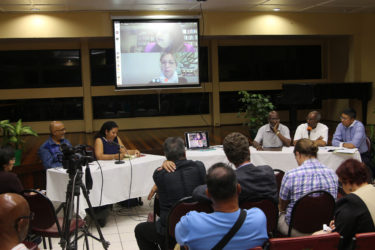Noting that it had made bold proposals in the 2015 general elections campaign, columnist Ralph Ramkarran has called on the APNU+AFC government to show that it is committed to constitutional reform by tabling a motion in parliament seeking support for its manifesto proposals.
Though it had promised within the first 100 days of its government to set up a Constitution Reform Committee to complete consultations, draft amendments and present these to the National Assembly, very little has happened in nearly two years and critics say the administration is simply not interested in this subject.
In his column in yesterday’s Sunday Stabroek, Ramkarran, a Senior Counsel, said the governing coalition in its 2015 manifesto had made the boldest proposals to ever have been introduced on the country’s political agenda since 1950.
Areas which the manifesto recommended for consideration by a Constitution Reform Committee included:
- The President should be elected by a majority of electors.
- There should be separate elections for the presidency and National Assembly.
- Executive powers should be shared between the President, Prime Minister and the Cabinet.
- The Cabinet should comprise members of the parties which have achieved at least 15% of the vote at the national elections.
- The supreme organs of democratic power should be the President and the National Assembly.
- The Prime Minister shall be the person who secures the second highest votes in the presidential elections.
- The executive powers and responsibilities of the Prime Minister should be increased to include some executive powers and responsibility over the Cabinet.
- The members of the Cabinet are subject to the approval of, and removal by, the National Assembly.
- The immunities of the President are to be reduced.

In attempting to fulfil its mandate, Ramkarran noted that the government appointed the Steering Committee for Constitutional Reform (SCCR) headed by Nigel Hughes to examine the process for constitutional reform and it reported about a year ago.
“The report is still before the Cabinet and the process appears to have been stalled. This has led to speculation that the government has lost interest in constitutional reform, even though it allocated $80 million to constitution reform and appointed Prime Minister (Moses) Nagamootoo to lead the process.
“If the speculation is not justified, the government can demonstrate its bona fides by tabling a motion in the National Assembly seeking support for its Manifesto proposals and the Hughes Report. I believe that such a move will meet with the overwhelming support of the Guyanese people”, Ramkarran asserted.
Adverting to the seminar two Fridays ago on Constitutional Reform organised by the Carter Center and funded by the British High Commission, Ramkarran declared that the “struggle for constitutional reform as a means to attain a political solution to Guyana’s sharp ethno-political divisions remains a burning necessity.”
He noted that while the PPP and a cross-section of civil society were represented, “conspicuously absent was any APNU or AFC party or government representatives”.
Ramkarran, who chaired the constitution reform process of 1999 to 2000, said that during the discourse, many ills of the society that needed redress were identified.
“One of the issues raised was the debilitating impact of ethno-political competition on governance. The possibility of constitutional reform creating structures that would result in the reduction of political suspicion and enhancing the level of cooperation was explored. Reference was made to the organizing principle of unity of the 1950 PPP, the PPP’s proposals for a coalition government with the PNC during the 1960s, then for a Patriotic Front Government in 1978, for a ‘winner does not take all’ system during the 1980s up to 1991 and the PNC’s proposals for shared governance in 2002. It was pointed out that the split of the PPP in 1955 resulted in ethnic voting since the 1957 elections, that this division has been politically exploited and is the major hindrance to our social and economic development up to the present time”, Ramkarran related.
He added that constitutional reform is even more important now at this crucial time when Guyana’s coming oil wealth will increase challenges to transparency and good governance.
“An agreed political structure that allows for participation of both parties in governance, while maintaining political competition and their separate identities, will create political legitimacy, end discrimination, reduce corruption, introduce more transparency, facilitate an agreed economic policy, establish equitable distribution of economic resources, tackle disadvantages or perceived disadvantages of groups, protect the environment and provide for a green economy. Although major reforms were adopted in the 1999-2000 constitution reform process, the failure to find a political solution left many feeling unfulfilled. And this continues to drive the clamour today”, Ramkarran stated.
Among other things, the SCCR recommended a reduction of immunities for the President, limiting the powers to prorogue or dissolve Parliament and excluding the Attorney General from Cabinet so the holder of that office remains unbiased and impartial. It envisioned the completion of the entire process within 18 months.
The body recommended a three-tiered reform system where a group of legal experts on the Constitution Reform Commission (CRC) would prepare a draft document encompassing some of the SCCR’s recommendations. This will then be distributed to stakeholders including representatives of political parties and civil society. The CRC will then be expanded to include representatives of political parties and civil society. The expanded CRC will then deliberate on submissions received and prepare a report which is to be perfected by its legal experts. This report will then be taken to the National Assembly for debate after which a referendum or some other method would be employed for the prospective adopting of the recommendations.
In addition to the SCCR, the government also commissioned a visit of experts from the United Nations System. A report has since been submitted. Some have criticized this UN initiative as a waste of time as it fails to take account of the fact that Guyanese completely managed the 1999-2000 constitution reform exercise and the key outstanding issues are well-known.





